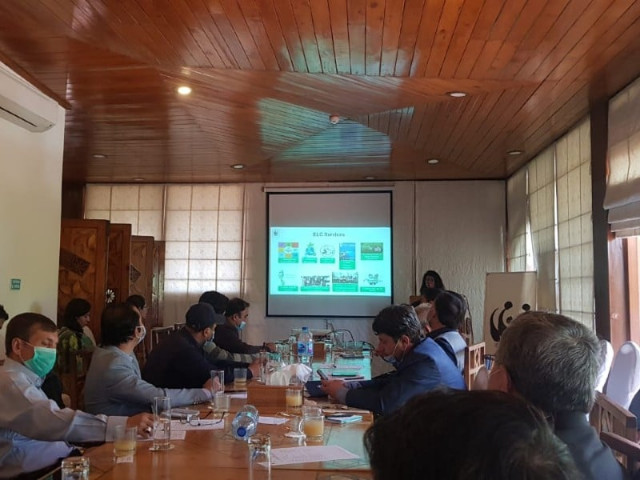Experts call for eco-friendly tourist activities
G-B govt has decided to develop 22 untapped tourist spots, says secretary tourism

Eco-friendly activities will pave the way for more tourism in Gilgit-Baltistan, experts said during a seminar organised by the WWF-Pakistan on Eco-Tourism Programme in collaboration with the tourism department of G-B.
The objective of the seminar was to create awareness about negative environmental impacts of irresponsible tourism in Pakistan, introduce different interventions like WWF Eco Lodge Certification, Eco Dining Certification and Panda’s Community Eco Lodge, under the WWF-Pakistan Eco-Tourism Programme, and engage with relevant stakeholders and community on actions pertaining to sustainable tourism.
The participants included representatives from the Department of Forest and Wildlife, Hotel Associations of G-B, Hunza, Nagar, Ghizer and Gojal, KIU, Serena Hotel, G-B-EPA, KADO and Tour Operator association.
While giving opening remarks, WWF-Pakistan Gilgit-Baltistan Regional Head Haider Raza said that eco-tourism used to be a bizarre word a decade ago, but now it is something that must be focused on and have an understanding of.
He said that a research conducted in Hunza and Diamer districts revealed the highest understanding of eco-tourism concepts in relevant government department and lowest in tourism companies and hotel management. "The WWF-Pakistan is organising this event in line with this year World Tourism Day, 2020 aiming to conserver and protect nature and cultural heritage," he added.
Commenting on the issue, Manager Climate Energy Program Nazifa Butt said that Pakistan has a huge potential for eco-tourism but we need to inculcate environmentally sustainable practices in the tourism sector, in a way that benefits not only the environment but community as well. "Continuous guidance and awareness need to be given to the hospitality sector, community and tourists to reduce the environmental impact," she added
Secretary Tourism Sumer Ahmed Syed said that the government of Gilgit-Baltistan has decided to develop 22 untapped tourist spots, adding that soft loans through the national bank of Pakistan will be provided to locals to initiate a new concept of ‘stay home’ parallel to hotel industry which will help to boost the local economy. "We need to give awareness on eco-tourism to all stakeholders to preserve our tourist destinations."
The tourism sector in Pakistan poses immense pressure on the environment; land degradation and deforestation, unsustainable construction of hotels and recreation spots, wasteful consumption of natural resources, transportation emissions, sewage and air pollution and the mismanaged solid waste, are disrupting the biodiversity and local heritage.
Keeping in view the aforementioned WWF-Pakistan, with its aim to promote environmental conservation and efficient use of natural resources, has devised a responsible tourism programme.
The WWF-Pakistan’s Eco-Tourism Programme is a unique and practical way to reduce the environmental footprint of the tourism industry in Pakistan while educating not only the hospitality sector but also engaging the community for their livelihood upliftment.
Through this programme, the WWF-Pakistan intends to provide support and guidance to improve the environmental performance of the hospitality sector while creating awareness for the employees and the tourists.
Pakistan was named the top holiday destination for the year 2020 by the US-based luxury and lifestyle publication Conde Nast Traveller.



















COMMENTS
Comments are moderated and generally will be posted if they are on-topic and not abusive.
For more information, please see our Comments FAQ